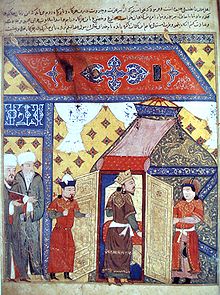Unveiling Faith: The Diverse Religious Landscape Of "King Nasir"
The name "King Nasir" resonates through different eras and contexts, evoking distinct images depending on who you're referring to. From powerful medieval caliphs ruling vast empires to a contemporary figure making waves in the entertainment industry, the title "Nasir" (or al-Nasir) has been adopted by individuals with diverse roles and backgrounds. This often leads to curiosity, especially regarding their personal beliefs and religious affiliations. This article aims to untangle the various "King Nasirs" and shed light on their religious identities, providing clarity on a name that bridges centuries and cultures.
The Legacy of "Al-Nasir": Medieval Islamic Caliphs
Historically, the title "al-Nasir" (meaning "the Victor" or "the Defender") was often adopted by Islamic rulers, signifying their role as protectors and champions of their faith. The provided data points to at least two prominent figures bearing this name in the medieval Islamic world, both of whom were caliphs, the highest spiritual and temporal leaders in Islam.
Muhammad al-Nasir: The Almohad Caliph
One such historical figure is Muhammad al-Nasir (c. 1182 – 1213), who served as the fourth Almohad Caliph from 1199 until his death. The Almohad Caliphate was a powerful Berber Muslim empire that controlled a significant portion of North Africa and Al-Andalus (Islamic Spain). His reign began on January 25, 1199, following the death of his father, Abu Yusuf Yaqub al-Mansur. Given his position as an Almohad Caliph, Muhammad al-Nasir was unequivocally a Muslim, leading a Muslim empire. Contemporary Christians even referred to him as "Miramamolín," a corruption of "Amir al-Mu'minin" (Commander of the Faithful), a title traditionally held by Islamic caliphs, further solidifying his identity as a Muslim ruler.
In the turbulent landscape of the medieval Middle East, a ruler like Muhammad al-Nasir, by virtue of his office, was expected to uphold Islamic law and traditions, fostering a sense of enlightened rule and, within his domain, a commitment to understanding among his subjects. His rule, like that of other Almohad caliphs, was deeply intertwined with the theological and legal principles of the Almohad movement, which was a reformist Islamic movement.
Al-Nasir li-Dīn Allāh: The Abbasid Caliph
Another significant historical figure is Abū al-ʿAbbās Aḥmad ibn al-Hasan al-Mustaḍīʾ, better known by his laqab al-Nāṣir li-Dīn Allāh (الناصر لدين الله), which translates to "The Defender of God's Religion." He was an Abbasid Caliph, reigning from 1158 to 1225. As an Abbasid Caliph, based in Baghdad, he was the spiritual and, to varying degrees, political head of the Sunni Muslim world. His very title, "Defender of God's Religion," leaves no doubt about his religious affiliation: he was a Muslim.
His reign was notable for the rise of the futuwwa groups, urban social organizations that had long existed in Baghdad and elsewhere. Al-Nasir li-Dīn Allāh strategically transformed these groups into an instrument of his rule. While these groups were often involved in urban conflicts, including sectarian riots, their integration into the Caliph's administration underscores the Caliph's active role in the social and religious fabric of his Islamic empire. This demonstrates his deep engagement with and leadership within the Muslim community of his time.
It's also worth noting that the name "Nasir" appears in other historical contexts, such as An-Nasir Muhammad ibn Qalawun, a Mamluk Sultan who ruled Egypt and Syria at various times, and even much earlier, Ashur-nasir-pal II, an Assyrian king from the 9th century BC. While these figures also bore variations of the name, their religious contexts differed significantly, with the Mamluk Sultan being a Muslim ruler and the Assyrian king adhering to ancient Mesopotamian polytheistic beliefs. For the scope of understanding "King Nasir religion" as commonly searched, the focus remains on the more recent and explicitly identified figures.
King Nasir: Faith in the Modern Entertainment World
Fast forward to the contemporary era, and we encounter a completely different "King Nasir" – a rising star in the entertainment industry. This individual's public persona and career trajectory are distinct from the medieval caliphs, leading to natural questions about his personal life, including his religious beliefs.
Identifying the Modern King Nasir
The contemporary King Nasir is known as Nasir Adeleke (stage name: King Nasir) or sometimes Nasir Jones. Born on January 22, 1997, in New York City, USA, he is an American of African descent, tracing his ancestry to Guinea-Bissau. He has garnered attention as an American adult film actor, singer, model, and producer, capturing attention with his music and film projects.
King Nasir's Stated Religious Beliefs
Unlike the historical caliphs whose religious identities were inherent to their roles, the modern King Nasir's faith is a matter of personal declaration. According to available information, King Nasir has explicitly stated his religious affiliation:
- King Nasir is a Sunni Muslim.
His belief system is rooted in the fundamental tenets of Islam, particularly the Five Pillars, which form the framework of Muslim life and worship:
- Shahada (Declaration of Faith): The affirmation that "There is no god but Allah, and Muhammad is His messenger." This is the foundational belief in the oneness of God and the acceptance of Muhammad as His final prophet.
- Salat (Prayer): The ritual prayers performed five times a day, facing the Kaaba in Mecca, symbolizing devotion and connection to God.
- Zakat (Charity): The obligatory giving of a portion of one's wealth to those in need, emphasizing social justice and communal welfare.
- Sawm (Fasting): The abstention from food, drink, and other physical needs from dawn to dusk during the month of Ramadan, fostering spiritual discipline and empathy.
- Hajj (Pilgrimage): The pilgrimage to Mecca, which every Muslim is expected to undertake at least once in their lifetime if they are physically and financially able.
These pillars represent the core practices and beliefs that guide the life of a Sunni Muslim, including King Nasir.
The Intersection of Faith and Public Life
For King Nasir, his faith, as a self-identified Muslim, has the potential to significantly influence his perspective and public actions. As suggested by experts, his adherence to Islam could lead to a greater emphasis on:
- Social Justice: Islam places a strong emphasis on fairness, equality, and aiding the less fortunate.
- Community Welfare: The concept of Ummah (the global Muslim community) fosters a sense of collective responsibility and mutual support.
- Cultural Preservation: Islam has a rich cultural heritage, and believers often feel a connection to preserving and promoting it.
While his career in the entertainment industry, encompassing music, film, and adult film, might seem unconventional to some when viewed through a religious lens, King Nasir's personal faith remains a distinct aspect of his identity. Understanding his stated beliefs provides insight into his personal framework, regardless of his professional endeavors.
Conclusion
The name "King Nasir" serves as a fascinating case study in historical and contemporary identity. We've seen that the title has been borne by powerful medieval Islamic caliphs like Muhammad al-Nasir (Almohad) and al-Nasir li-Dīn Allāh (Abbasid), whose roles inherently defined them as Muslim rulers and defenders of their faith. Their reigns were deeply embedded in the religious and political structures of their respective Islamic empires, making their adherence to Islam an undeniable fact of their historical existence.
In stark contrast, the modern King Nasir, an American entertainer named Nasir Adeleke/Nasir Jones, explicitly identifies as a Sunni Muslim. His faith is a personal declaration, guiding his beliefs in the Five Pillars of Islam. This distinction highlights that while the name "Nasir" has historical roots in Islamic leadership, its contemporary bearer demonstrates a personal commitment to the faith within a vastly different societal and professional context. Ultimately, whether referring to a medieval caliph or a modern entertainer, understanding the specific context is key to comprehending the religious dimensions associated with the name "King Nasir."

KING NASIR BIOGRAPHY, CAREER AND NET WORTH

King Nasir Biography, Age, Height, Wiki, Career, Pics - Vip Actors

An-Nassir Muhammad - Wikipedia, la enciclopedia libre